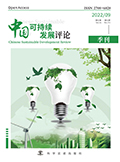

随着全球环境问题的日益严峻, 绿色转型成为各大城市发展的重要议题。北京市作为中国的首都, 其经济发展与环境保护的矛盾尤为突出, 探索实现高质量绿色发展的路径势在必行。本研究旨在深入剖析数字经济对于北京市绿色转型的影响及其内在作用机制, 以期为城市可持续发展提供理论依据和政策参考。本文通过分析数字经济发展在生产层面、生活层面和生态层面的积极作用, 揭示了其在推动北京市产业结构升级、优化就业结构、引导社会资本流入以及提升居民生活质量和改善生态环境方面的关键角色。研究发现, 数字经济不仅促进了以技术更新为核心的新兴产业发展, 还通过与传统产业的深度融合, 推动了产业优化升级, 降低了能耗, 提高了能效。此外, 数字技术的普及和应用改善了居民消费模式和生活习惯, 助力低碳生活。本研究最终提出了针对北京绿色转型的政策建议, 包括加强绿色技术研发推广、深化能源消费智能化改革、推进智慧城市建设和强化碳排放监测等, 对于理解数字经济与绿色转型的关系、制定相关政策以及推动可持续发展具有重要理论和实践意义。
With the increasingly severe global environmental problems, green transformation has become an important issue for the development of major cities. As the capital city of China, Beijing faces a particularly prominent contradiction between economic development and environmental protection, making it imperative to explore a path towards high-quality green development. This study aims to analyze the impact of digital economy on Beijing' s green transformation and its internal mechanism, with a view to providing theoretical basis and policy reference for the city' s sustainable development. By analyzing the positive effect of digital economy development at the production, lifestyle. and ecological levels, this paper g highlights its key role in upgrading Beijing' s industrial structure, optimizing the employment landscape, directing the influx of social capital, as well as enhancing residents’ quality of life while improving the ecological environment. The study finds that the digital economy not only promotes the development of new industries centered on technological advancements, but also facilitates the optimization and upgrading of traditional industries, resulting in reduced energy consumption and improved energy efficiency through its deep integration. Moreover, the popularization and application of digital technologies have improved residents' consumption patterns and lifestyles, contributing to a low-carbon way of living. This study concludes by presenting policy recommendations for Beijing' s green transformation, which encompass enhancing research, development and promotion of green technologies, deepening the intelligent transformation of energy consumption, accelerating the construction of smart cities, and strengthening carbon emissions monitoring, etc. These recommendations are of great theoretical and practical significance for exploring the relationship between the digital economy and the green transformation, formulating relevant policies, and promoting sustainable development.